Sensor Sweep: Runequest, Jewels of Gwalur, Steve Hickman
Monday , 26, July 2021 Sensor Sweep 2 CommentsReading (With Both Hands): As someone who really likes adventure books, and really likes to blog about adventure books, there is a fascinating tension in the whole field because it is fundamentally popular entertainment, but the people who like to create these stories and the people like me who like to talk about them often find these stories interesting for reasons at cross purposes with their being popular entertainment. There is a commercial or business aspect here that a vocal portion of the readers, people like me, are not necessarily representative of the bigger pool of readers and buyers.
D&D (Goodman Games): Did you know that ‘Vecna’—he of the disembodied hand and eyeball—is a deliberate anagram of ‘Vance?’ Gary Gygax made no secret of his love for the work, and person, of Jack Vance, and Vance’s Dying Earth stories in particular were often cited (see Appendix N) by Gygax as a major influence on the genesis of Dungeons & Dragons. Most prominently, of course, in what came to be known as the ‘Vancian magic system’—a term that emerged from the world of RPGs rather than any literary fandom—but there are many other elements, and indeed a prevailing tone, in D&D that are inspired in whole or in part by the works of Jack Vance.
Art (DMR Books): Word got out last weekend that the highly-respected SFF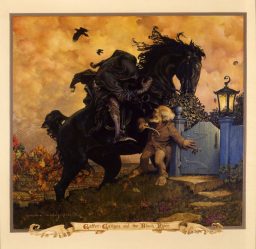 artist, Stephen Hickman, had died of natural causes. Various causes, natural and otherwise, have prevented me posting until now. When it comes to Steve Hickman, respects must be paid. His professional career spanned five decades, which was exemplified by a consistently high level of quality.
artist, Stephen Hickman, had died of natural causes. Various causes, natural and otherwise, have prevented me posting until now. When it comes to Steve Hickman, respects must be paid. His professional career spanned five decades, which was exemplified by a consistently high level of quality.
Cinema (Kairos): If you’re a member of Generation X or Gen Y, chances are the films of Quentin Tarantino affected how you interact with pop culture to this day. His status as the last man standing of the indie directors who broke onto the early 90s film scene makes him a black swan. The fact that he started as a movie nerd working at a Los Angeles video store makes him a Pop Cult high priest.
Cinema (Arkhaven Comics): Aliens is my favorite Eighties blast-flick, even nudging out Predator. For whatever reason, this is the one that speaks to me. What James Cameron got right was basically everything. It was massively influential in 1980s science fiction pop-culture. Aliens created an entire aesthetic template for the Space Marine that everyone who followed Cameron had to either consciously accept or reject. The Colonial Marines were up there with Starfleet. And Aliens setup a film that would hold the title of “most disappointing sequel of all time” for the next 25 years.
nudging out Predator. For whatever reason, this is the one that speaks to me. What James Cameron got right was basically everything. It was massively influential in 1980s science fiction pop-culture. Aliens created an entire aesthetic template for the Space Marine that everyone who followed Cameron had to either consciously accept or reject. The Colonial Marines were up there with Starfleet. And Aliens setup a film that would hold the title of “most disappointing sequel of all time” for the next 25 years.
Fiction (Rough Edges): Levon Cade left his profession behind to work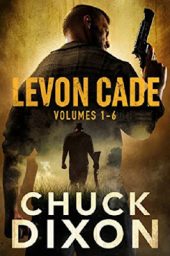 construction. He just wants to live an anonymous life and be a good dad to his daughter. But when a local girl vanishes, he’s asked to return to the skills that made him a mythic figure in the shadowy world of counterterrorism. Follow Levon and his daughter while they go on the run from the Feds and a growing army of enemies that Levon makes along the way.
construction. He just wants to live an anonymous life and be a good dad to his daughter. But when a local girl vanishes, he’s asked to return to the skills that made him a mythic figure in the shadowy world of counterterrorism. Follow Levon and his daughter while they go on the run from the Feds and a growing army of enemies that Levon makes along the way.
Cinema (Neotextcorp): Recently released from prison, an experienced, hardened Englishman called Wilson goes to Los Angeles to uncover the truth about his daughter Jenny’s death, refusing to believe the official story of her getting into a fatal car crash. In the City of Angels he meets his daughter’s friends, who tell him about a shady record producer his daughter was dating. The producer, Terry Valentine, is heavily involved in the world of drug trafficking and, at the same time while Wilson’s investigating his possible involvement in Jenny’s death, DEA agents are carefully monitoring Valentine’s activities.
Edgar Rice Burroughs (Pulpfest): Please join PulpFest 2021 and ERBFest on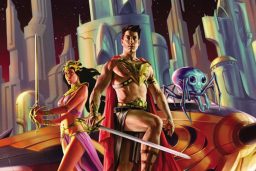 Friday, August 20, as we welcome Cathy and Christopher to the DoubleTree by Hilton Hotel Pittsburgh – Cranberry in Mars, Pennsylvania for the latest updates on the Edgar Rice Burroughs Universe, the ERB Authorized Library, and other projects inspired by the great man’s work. Their talk is part of our fine line-up of Burroughs programming at this year’s PulpFest and ERBFest 2021.
Friday, August 20, as we welcome Cathy and Christopher to the DoubleTree by Hilton Hotel Pittsburgh – Cranberry in Mars, Pennsylvania for the latest updates on the Edgar Rice Burroughs Universe, the ERB Authorized Library, and other projects inspired by the great man’s work. Their talk is part of our fine line-up of Burroughs programming at this year’s PulpFest and ERBFest 2021.
Appendix N (Grognardia): Long ago, I posted very briefly on this blog about the strange serendipity between the bibliographies of 1978’s RuneQuest and 1979’s Advanced Dungeons & Dragons Dungeon Masters Guide. Both bibliographies are the fourteenth appendix in their respective volumes, which is quite a coincidence – and a coincidence I am sure it is (for logistical reasons, if nothing else). Even if it weren’t, the writers of RQ make it quite clear that, despite superficial similarities, their Appendix N is actually very different in both its content and intention than Gygax’s own list.
Robert E. Howard (Rob Smith Jr): Seems to me this was one of Howard’s easier books to write. He just rolled a Maguffin out towards the horizon and came up with a story of Conan chasing it. Sure starts easy involving climbing and meandering about looking for something or other. Then the girl gets dropped in and Conan is distracted from his mission. There’s a bit of folderol of Conan acting like Perry Mason and it all ends as most Conan stories do.
D&D (Dweller of the Forbidden City): 1. AD&D has lots of rules for combat. 2. D&D has few rules for social interaction. 3. Therefore D&D is “about” combat. There are a few flaws in this argument:
D&D has lots of rules for the things you can’t really do, since magic isn’t real, there are rules for that, since we don’t want players hitting each other with actual swords, there are rules for combat. It’s not that the game is “about” combat, it’s just that things like combat need rules as we can’t act them out.
History (American Thinker): Today in history, on July 22, 1456, the West scored one of its greatest victories over the jihad. Three years after conquering Constantinople, the Ottoman Sultan, Muhammad II, at the head of over 100,000 Turks, marched towards the strategic fortress town of Belgrade, key to Western Europe, in the spring of 1456. Cognizant of all the death, destruction, and mindboggling atrocities this massive Muslim march presaged — memory of the sack of Constantinople was still fresh — a great panic swept through the Danube region. Even Hungarian king Ladislaus V fled his capital to Vienna (on the pretext that he was going “hunting”).
RPG (Matthew J. Constantine): Back when I was first getting into Call of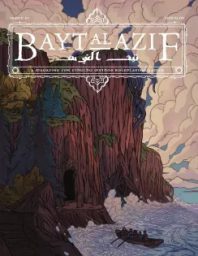 Cthulhu, there was a fan-produced magazine called The Unspeakable Oath. Copies of the magazine’s early issues were like gold in the community. This was a time before the internet was ubiquitous, so you couldn’t just search & find stuff from around the globe. In its pages, I found lots of great stuff, including a few things that changed my perception of the classic tabletop RPG and the Lovecraftian Mythos itself. Issues of that magazine were always spotty, and eventually came out so infrequently that I stopped buying it, especially after I drifted away from active participation in the hobby.
Cthulhu, there was a fan-produced magazine called The Unspeakable Oath. Copies of the magazine’s early issues were like gold in the community. This was a time before the internet was ubiquitous, so you couldn’t just search & find stuff from around the globe. In its pages, I found lots of great stuff, including a few things that changed my perception of the classic tabletop RPG and the Lovecraftian Mythos itself. Issues of that magazine were always spotty, and eventually came out so infrequently that I stopped buying it, especially after I drifted away from active participation in the hobby.
Fiction (Cthulery): This little Bloch tale is more characteristic of Unknown, or for that matter, The Twilight Zone, then WT. But nevertheless Bloch was a name by 1942, so his byline was good for sales. This is Bloch in his mature mode; a lot of humor, a lot of misanthropy (I’m not sure Bloch wrote much after 1940 that didn’t disparage current trends in fashion, slang, music and deportment – the old sourpuss! And he was only 25 when he wrote this!), some dark and criminal doings, and (sometimes) elements of the supernatural. There’s nothing remotely Lovecrafty here, but the tale’s done with gusto and it shows Bloch hadn’t forgotten ol’ Ludvig Prinn.
Horror (AQS Reviews): The Gulp consists of five novellas that take place in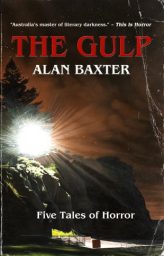 a country/coastal town in Australia. I have never been to Australia, nor is it on my list of places I would like to go. And this is after one of the most significant people in my life having been from Sydney. That being said, The Gulp could really be anywhere, so shuffle the lingo a bit and yeah – its the creepy coastal town in Your Country. This is really cool because the universality of the setting is important to this particular type of writing, I think. Drawing the readers in and immersing them in this town is really key to these stories.
a country/coastal town in Australia. I have never been to Australia, nor is it on my list of places I would like to go. And this is after one of the most significant people in my life having been from Sydney. That being said, The Gulp could really be anywhere, so shuffle the lingo a bit and yeah – its the creepy coastal town in Your Country. This is really cool because the universality of the setting is important to this particular type of writing, I think. Drawing the readers in and immersing them in this town is really key to these stories.
Lovecraft (Playernone): A young, Bostonian surveyor arrives in the rural area around Arkham, where he stumbles upon a desolate, lifeless area, where all seems to have turned into grey ashes. He begins to look into the mystery of the place known by locals as a “blasted heap” and finally finds an old man, Ammi Pierce, who relates to him what caused the desolation several decades back.
Games (Sprigg’s Scribblings): You’re here to read about Traveller, right? I did a post recapping the first book, Characters and Combat, so I’m going to do the same with the second book today. Bear in mind, this is the original version from 1977, not the revised book from 1981, or any of the later editions of Traveller. So, the first thing I noticed about starships in \Traveller is that they are…small. You can recreate the Millennium Falcon with some work, but forget the Starship Enterprise, let alone a Star Destroyer. Capital ships are outside the scope of these rules. You could do an Enterprise shuttlecraft, but not the ship itself.
Science Fiction (Classics of Science Fiction): he Man Who Lost the Sea” is a magnificent work of second person prose that is as confusing as a pile of jigsaw puzzle pieces without the box. As you read the story the picture is revealed with the placement of the last piece. “The Man Who Lost the Sea” was first published in October 1959 issue of The Magazine of Fantasy and Science Fiction. It was reprinted in Best American Short Stories 1960, The Best from Fantasy and Science Fiction (Ninth Series, 1960), and Judith Merril’s annual anthology,The Fifth Annual of the Year’s Best SF (1960) where I just read it.
magnificent work of second person prose that is as confusing as a pile of jigsaw puzzle pieces without the box. As you read the story the picture is revealed with the placement of the last piece. “The Man Who Lost the Sea” was first published in October 1959 issue of The Magazine of Fantasy and Science Fiction. It was reprinted in Best American Short Stories 1960, The Best from Fantasy and Science Fiction (Ninth Series, 1960), and Judith Merril’s annual anthology,The Fifth Annual of the Year’s Best SF (1960) where I just read it.
Authors (Dark Worlds Quarterly): The final part of Fredric Brown’s career settled into a slower paced routine. He wrote a Mystery novel a year, did a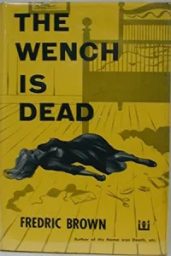 short stint in Hollywood that saw his stories adapted for Alfred Hitchcock Presents. As the Pulps died, Brown switched to writing for the Men’s magazines, some like Playboy paying very well. He was a regular at Fantasy & Science Fiction and Ellery Queen Mystery Magazine. (Excellent magazines but neither used interior illustrations so the amount of Brown art was reduced.)
short stint in Hollywood that saw his stories adapted for Alfred Hitchcock Presents. As the Pulps died, Brown switched to writing for the Men’s magazines, some like Playboy paying very well. He was a regular at Fantasy & Science Fiction and Ellery Queen Mystery Magazine. (Excellent magazines but neither used interior illustrations so the amount of Brown art was reduced.)
Fiction (M Porcius): Hugh B. Cave, August Derleth and Carl Jacobi are all writers whose work I have found pretty uneven. But they are also writers closely associated with Weird Tales, and as readers of MPorcius Fiction Log know, Weird Tales, and the unique magazine’s 1930s issues in particular, is a topic close to this blog’s heart. So today we take a look at one story by each of these guys that debuted in an issue of Weird Tales from the early Thirties. These three stories come under the spotlight because they were all selected by Stefan Dziemianowicz, Robert Weinberg, and Martin H. Greenberg for 1997’s female-vampire-oriented anthology Girls’ Night Out, a recent addition to the MPorcius Library.
Fiction (Paperback Warrior): Frank G. Slaughter (1908-2001) is an alumnus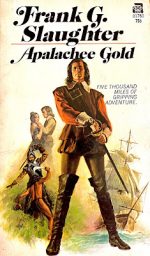 of Duke and Johns Hopkins University. He became a successful surgeon in 1930, working first in Virginia before moving to Jacksonville, FL in 1934. In 1946, Slaughter exchanged his scalpel for a typewriter and became a full-time novelist. Throughout his career, Slaughter has written 62 books and achieved sales of over 60 million copies. Though most of Slaughter’s novels are medical fiction, he has many biblical and historical novels. His 1954 Ace paperback, Apalachee Gold, is an adventure novel based on a little known historical event in Florida known as the De Vaca Expedition.
of Duke and Johns Hopkins University. He became a successful surgeon in 1930, working first in Virginia before moving to Jacksonville, FL in 1934. In 1946, Slaughter exchanged his scalpel for a typewriter and became a full-time novelist. Throughout his career, Slaughter has written 62 books and achieved sales of over 60 million copies. Though most of Slaughter’s novels are medical fiction, he has many biblical and historical novels. His 1954 Ace paperback, Apalachee Gold, is an adventure novel based on a little known historical event in Florida known as the De Vaca Expedition.
History (Western Fictioneers): As I continue my research into medical history the medical textbooks that were used by the military of both sides in the Civil War continue to be a fascinating resource. The these snippets from JJ Chisolm’s Manual of Military Surgery for the surgeons in the Confederate States army.
Cinema (Arkhaven Comics): I had stated in my RE:View of Raiders of the Lost Ark, “Think about it. If Jones had done nothing in this story but teach at Marshall, he would have changed nothing that eventually happened. The Nazis would have grabbed the amulet from Marion, found the Ark and melted themselves without any help whatsoever from Indiana Jones.”
Gaming (Goodman Games): Did you know that several of the adventures on the Goodman Games site have been played online? And that you can watch those live-play events over on our YouTube page? In fact, we’ve gathered those adventures together on a special page so that you can watch them played before you choose to buy. Whether it be for DCC RPG, MCC RPG, Original Adventures Reincarnated, DCC Lankhmar, or any other setting, we’ve got a game there for you to experience.
Re vecna as an anagram of Vance, also his lieutenant Kas is a play on Clark Ashton smith’s initials kas=cas! Basically Clark Ashton smith takes revenge on Vance for stealing his dying earth paradigm when kas kills vecna.
Whoa! Finsally got around to checking this out. Another fine Sweep!
Both essays from Dark Herald are excellent, as is Niemeier’s look at Tarantino.
That’s a great article from AmThink. Never forget.